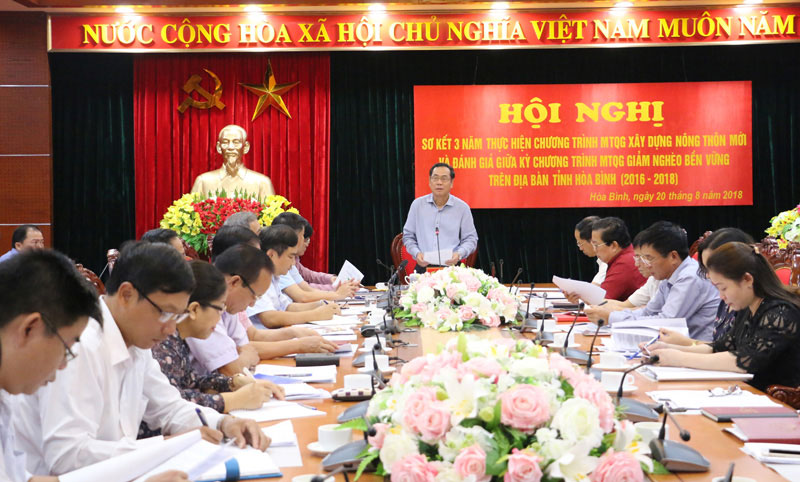
(HBO) – The People’s Committee of the northern mountainous province of Hoa Binh recently held a teleconference with its districts and city to review the implementation of the national target programmes on building new-style rural areas after three years (2016-2018) and on sustainable poverty reduction in the 2016-2020 period.
Deputy Secretary of the provincial Party Committee and Chairman of
the People’s Committee Nguyen Van Quang presided over the conference.

Vice Secretary of the provincial
Party Committee and Chairman of the People’s Committee Nguyen Van Quang
delivers a speech to conclude the event.
During the implementation of the national target programme on
new-style rural area building in 2016-2018, the province fulfilled more than 65
percent of the criteria and tasks which were assigned by the Prime Minister
until 2020, despite a range of challenges. All communes have met at least seven
criteria of the programme and Hoa Binh city is expected to receive the status
of new-style rural area this year.
This was attributable to the efforts of party committees, administrations
and Fatherland Front Committees at all levels, along with all organisations
from provincial to grass-root levels and local people.
Total financial sources to carry out the target programme on
new-style rural area building in three years reached about 6,654 billion VND (293
million USD). As a result, infrastructure has been upgraded, giving a facelift
to rural areas.
Many production models prove to be effective, generating high
income for local people. Per capita income in Hoa Binh’s rural areas in 2018 was
estimated at 24.8 million VND (1,063 USD). To date, 51 communes of the province
have been recognised as new-style rural areas, equivalent to 67 percent of the
plan. Each commune has fulfilled an average of 12.62 of the total criteria, or
85 percent of the plan.
The national target programme on sustainable poverty reduction
also saw positive outcomes, as infrastructure in disadvantaged regions has been
built. Policies on poverty alleviation have been promptly carried out, which improve
people’s welfare and access to social services.
Therefore, in late 2017, the province’s poor household rate dropped
to 18 percent, (38,293 families). The figure sees an annual decrease of 3.19
percent, meeting the target.
In late 2018, the rate is expected to fall 14.9 percent, down 3.1
percent year-on-year and 9.48 percent against the same period of 2016,
representing a annual decline of 3.16 percent./.
The Standing Board of the Hoa Binh provincial Party Committee has agreed in principle on a proposal by the Standing Board of the Party Committee of Hoa Binh city to gather feedback on the city’s 1:2000 zoning plan, which forms part of its broader urban development strategy.
Hoa Binh province has made notable progress in public administration reform and digital government development, with the satisfaction index among citizens and businesses reaching over 84%, according to recent government evaluations.
Thanks to great efforts by local authorities in recent times, the governance and public administration performance of Mai Chau district has been significantly improved.
In the afternoon of June 6, the Party Committee, the People's Council, the People's Committee and the Fatherland Front of Lac Son district solemnly held a meeting to celebrate the 139th anniversary of the district's founding (1886–2025) and the 79th anniversary of the establishment of the district's Party Committee (1946–2025). There was the attendance of Mr. Bui Van Thang, the Vice Chairman of the Provincial People's Council; Mr. Quach Tat Liem, the Vice Chairman of the Provincial People's Committee; Ms. Dang Bich Ngoc, the Deputy Head of the National Assembly Delegation of the province; as well as the former leaders of the province and district through various periods, who are the natives of the district.
Implementing the Politburo’s Resolution No. 57-NQ/TW on breakthroughs in science – technology, innovation, and digital transformation is a golden opportunity for the northern mountainous province of Hoa Binh to renew growth model, improve competitive edge and shorten digital gap.
Resolution 57-NQ/TW, issued by the Politburo on December 22, 2024, identifies sci-tech, innovation, and digital transformation as strategic breakthroughs to build a developed and prosperous nation. In Hoa Binh province, this spirit is not just a slogan, it’s being put into action through concrete initiatives that form a "new development triangle”: digital citizenship, digital economy, and digital administration.



